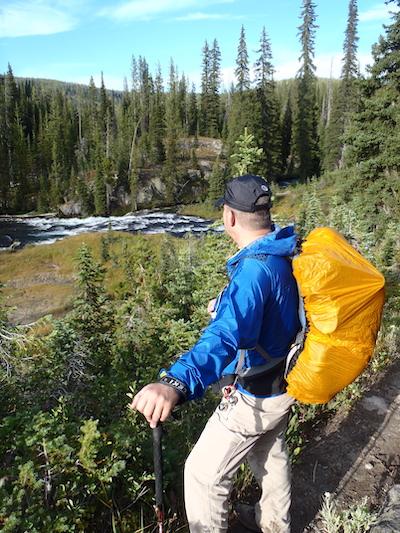
Does it seem equitable that backcountry travelers in the parks should pay a greater per-person fee than air-tour passengers?/Kurt Repanshek file
Trying to understand the National Park Service's visitor fee structure can be, well, baffling if not impossible. Some fees seem reasonable and equitable, others, not so much.
For example, should the fee you pay to a park for hiking in the backcountry be higher than the fee for those who board a helicopter to fly over a park?
That question came to mind last week after Grand Canyon National Park announced a 50 percent increase in the per-person cost -- from $8/night to $12/night -- to backpack in the park. Beginning in July, that experience will cost you a $10 permit application fee, and then $12 per night per person. So a party of four heading out for three nights would be charged $154 for walking, or riding, into the backcountry with their food and shelter on their backs. In addition, of course, to the park entrance fee ($35 per vehicle).
Grand Canyon staff say the increase is necessary because the backcountry fees haven't been changed since 2015, and the costs of managing the backcountry program and offices have gone up.
Now, you can debate whether $154 for four people to spend three nights in the backcountry, where you're traveling in a small group with likely no impact other than where you pitch your tent, and probably no interaction with other backcountry travelers, is pricey.
But compare that cost to the park fee you'd encounter if you and your three companions wanted a 50-minute air tour that lifts you above the Kīlauea volcano in Hawai'i Volcanoes National Park for a bird's-eye view of the possibly erupting crater. You'd fork out about $1,500 alone for your party to reserve a private helicopter tour, which generates noise for the on-the-ground visitors and other unknown impacts to the park's natural and cultural resources.
How much more would you pay to Hawai'i Volcanoes for entering its air space over the most visitor-concentrated part of the park? Twenty-five dollars. Not per person, but for four passengers, the pilot, and the $1.5 million (used) helicopter. Or $5 less than it costs you to drive into the park, and much less, per person, than what you'd pay to walk in the backcountry of Grand Canyon for four days: $38.50 per backpacker vs. $6.25 for the helicopter rider. Even the backpacker's single day cost -- $9.62 -- is more than the flight-seer's. Greater still when you consider the park entrance fee.
Staff at Hawai'i Volcanoes currently is working to develop a reasonable Air Tour Management Plan. In the documents for that plan, the park staff notes that since 1993, "commercial air tour operators currently conducting air tours over the Park are required to pay a fee (currently $25 for each aircraft with 25 passengers or less) for each air tour conducted."
Not under consideration as work on that plan moves forward is whether that $25 fee, which has never changed since 1993, is reasonable or should be increased. That's because parks don't have the authority to touch that fee, I'm told.
Perhaps there's a good rationale for the disparity in backcountry and air tour fees, but it's not evident. Nor is it readily evident why some parks charge a per-person per-night fee for backpackers, and why others don't.
Since the National Park Service has built in some uniformity to park entrance fees, perhaps it's time to do the same with backcountry and air tour fees, and to resolve some of the disparities along the way.

 Support Essential Coverage of Essential Places
Support Essential Coverage of Essential Places




Comments
Interesting comparison. How is that structured? Does the helicoptor company pay the $25 to the park or is that a cost to the passanger. If the latter, I assume the helicoptor company is paying hefty fees that are imbedded in their rental prices. Also the "per hour" pricing even at $25 is higher than the hikers. But, if it were up to me,I would ban, or at least severly limit the helicoptor tours all together.
The Backcountry fees at Grand Canyon are obscene. These are public lands, not a for profit amusement park. All involved should be deeply ashamed. Neither of the excuses offered is even rational. The hypocrisy of an agency that claims to care about "diversity, equity, and inclusion" deliberately pricing out half the country is astonishing.
$38.50 is pricing out half the country? With the price of gasoline it will cost far more to get there than stay the 3 nights.